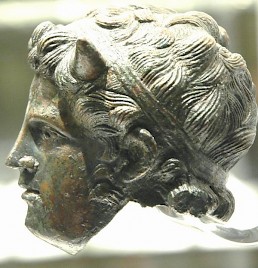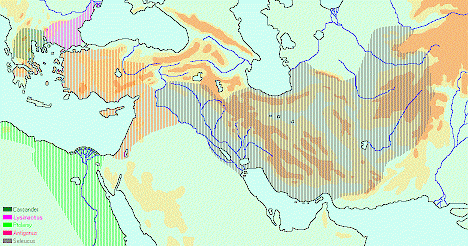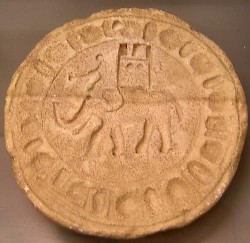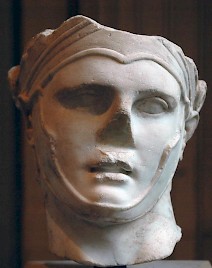Diadochi 8: The Fourth Diadoch War (2)
Diadochi ("successors"): name of the first generation of military and political leaders after the death of the Macedonian king and conqueror Alexander the Great in 323 BCE. To settle the question whether his empire should disintegrate or survive as a unity, and, if so, under whose rule, they fought several full-scale wars. The result, reached by 300, BCE, was a division into three large parts, which more or less coincided with Alexander's possessions in Europe, Asia, and Egypt.
During the next quarter of a century, it was decided whether these states could endure. As it turned out, there were no great territorial changes, although there were dynastic changes. After 280, the period of state-forming came to an end with three great states: Antigonid Macedonia, Ptolemaic Egypt, and the Seleucid kingdom in Asia.

In the summer of 306, Antigonus Monophthalmus and Demetrius were at the zenith of their power. However, the seeds of their downfall had been sown on the day when Seleucus had recovered Babylonia. Antigonus remained focused on the west and ignored the east, which was a grave error of judgment, because the former Achaemenid empire, which Seleucus was slowly rebuilding, had once been a formidable opponent, and so would Seleucus' empire be.
After the naval battle of Salamis, Ptolemy's realms were defenseless: his entire navy was lost. Seizing the opportunity, Antigonus marched to Egypt with a very large army. He knew that Ptolemy was not defeated yet and understood that he had to use as many soldiers as possible to ensure victory. The supplies were carried by his navy, commanded by Demetrius. His marines were to launch the first attack on Egypt. The plan was excellent, but the weather conditions were terrible: storms prevented the navy from approaching Egypt. From now on, Antigonus' army could no longer be fed, and it had to return. Ptolemy was saved.
From now on, there were several kings and kingdoms. The big question for the future was this: which political model was to prevail? Was Alexander's empire reunited or was it to disintegrate in smaller units? Was Antigonus' or Ptolemy's model more successful? Within five years, a decision would be reached during the battle of Ipsus (below).
Although Antigonus and Demetrius had lost Egypt, they had kept the initiative in the war. Ptolemy was seriously weakened, Seleucus was occupied in the eastern satrapies, and Cassander had to restore order in Greece. A new attack on Ptolemy seemed unwise and a war in the east was not Antigonus' priority; therefore he decided to attack Cassander. As a preparation, Demetrius had to besiege Rhodes, a mercantile republic that possessed a large navy and controlled the entrance to the Aegean Sea. If Rhodes fell, Antigonus and Demetrius could strike anywhere they wanted. Another reason to subdue the city-state was the fact that it could help Ptolemy rebuilding his navy, something that Antigonus wanted to prevent at all costs. The siege started in 305.
Again, Demetrius impressed the world with the size and quantity of his siege machines and the almost scientific approach of the citadel of Rhodes. One of his siege-towers was ten stories and 40 meters high, heavily armored and bristled with artillery. However, all his machines did not bring him victory: Rhodes was reinforced by Cassander and Lysimachus and especially Ptolemy. They knew that as long as Rhodes withstood Demetrius, they were safe. So, a relatively unimportant siege became one of the largest battle-fields in the Fourth Diadoch War.
The siege lasted one year and ended in a compromise. The Rhodians promised that they would be loyal to Antigonus and Demetrius and would support them against all their enemies, except Ptolemy. In the propaganda of Antigonus, this was presented as a big victory, and Demetrius accepted the surname Poliorcetes, 'taker of cities'. Ptolemy also received an additional name: he was called Soter, the Savior. Thus ended the siege of Rhodes.
Modern scholars usually state that the Rhodian campaign was a half-success, but this might be off the mark. The policy of Antigonus and Demetrius policy had been to leave towns ungarrisoned ('free and autonomous'), and so was Rhodes. During the next years, Demetrius was able to fight a war against Cassander in Europe; this had been Demetrius' aim, and he had achieved it. On the other hand, it could easier have been reached by diplomatic means.
In the autumn of 304, Demetrius went to Greece, where Athens was besieged by Cassander. The Macedonian ruler was expelled and Demetrius continued to liberate the Greek towns. He won over Corinth and almost the entire Peloponnese. Then, he convened a meeting and organized a League of Greek towns, like the one that had been founded by Alexander's father Philip (303). The towns were to be free and autonomous, Demetrius was to be their general, and had the right to conscript soldiers (text of the charter of the League).

At this point, Cassander sued for peace (302). But Demetrius and Antigonus had been very successful and were convinced that they could defeat Cassander. Therefore, they demanded unconditional surrender, which Cassander was unwilling to contemplate. He broke off the negotiations and the war was resumed. Demetrius invaded Thessaly, where he and Cassander fought a war of nerves: the two armies built large camps and kept an eye on each other, but they did not join battle.
In the meantime, Cassander had urged his allies Ptolemy of Egypt, Lysimachus of Thrace and Seleucus of Babylonia to come to his aid. The three men were now stronger than they had been before the Fourth Diadoch War broke out, and they promised to attack Antigonus. These diplomatic movements made it impossible for Demetrius to attack in Thessaly. He concluded an armistice with Cassander, and returned to the east, the new theater of war. His camp in Thessaly became the new site of the city of Halos (text).

Antigonus now concentrated his armies in what is now Turkey, because Lysimachus had invaded this part of Antigonus' kingdom. This was a big surprise, because Lysimachus had been the weakest of Antigonus' enemies: as king of Thrace, he still had to fight the Thracians, and during the last twenty years, he had won as many victories as he had suffered defeats. Nobody expected that, of all persons, Lysimachus would attack the powerful Antigonus and his son.
But he had a large war-fund, accepted several units of the army of Cassander, invaded Asia, overran the west coast, and captured Sardes and Ephesus, two very rich cities. Antigonus hurried to the west, Demetrius arrived from Greece, and Lysimachus was trapped between two armies (summer 302). Cassander sent him reinforcements, but Demetrius' navy intercepted them. However, Lysimachus was able to postpone a large scale battle, hoping that there would be reinforcements.
In the winter of 301, they seemed to arrive, when Ptolemy invaded Syria, but he turned back when he received a false report that Antigonus had been victorious. Antigonus and Demetrius were now preparing for a decisive blow against Lysimachus and the invasion of Europe. They isolated their opponent near Ipsus in Phrygia.

At that moment, however, Seleucus arrived. He had been fighting in the east for more than six years, had conquered all eastern satrapies (Bactria in 307), and had concluded a peace treaty with the Indian king Chandragupta Maurya (304), who had occupied the Indus valley. Seleucus had given these territories to him, and had received a large number of war elephants (500 according to our sources). Now, he was returning to the west. Antigonus had tried to prevent his arrival by sending an army to Babylonia, but Seleucus had simply ignored it, knowing that the decisive battle was to take place in Phrygia.
So, he suddenly appeared at Ipsus, and immediately sided with Lysimachus. It is not exactly clear what happened, but it is certain that Demetrius, who commanded Antigonus' cavalry, drove back his opponents and pursued them, leaving one wing of his father's infantry unprotected and an easy target for the elephants. So, Seleucus' forces decided that battle. Antigonus was killed by a rain of spears and arrows, Demetrius managed to escape with a small force. Lysimachus and Seleucus now had to divide the kingdom of Antigonus, and had to deal with one competitor, Ptolemy.